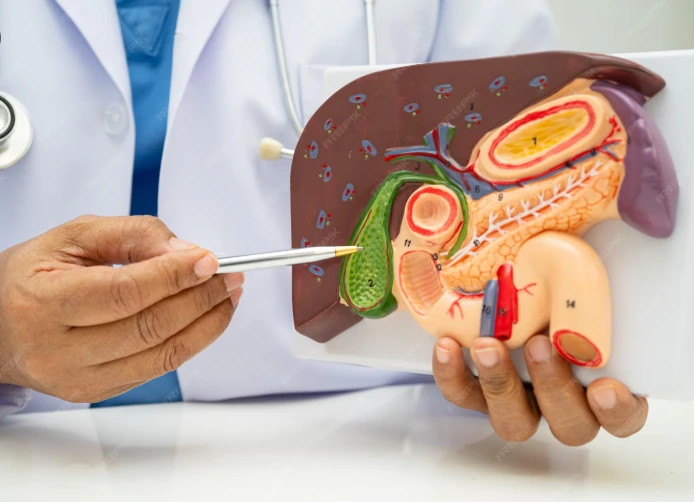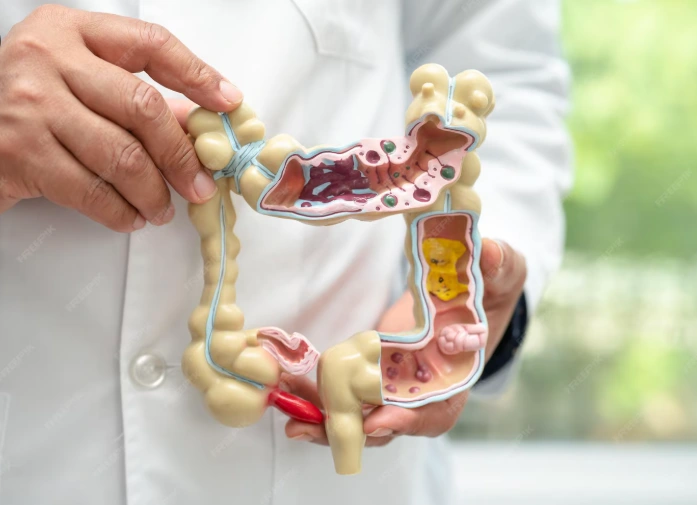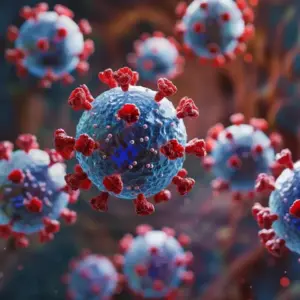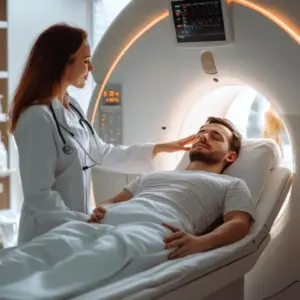Comprehensive Overview of GI Tract Tumors
Learn about GI tract tumors, their causes, diagnosis, treatments, and prevention for maintaining digestive health.

Tumors of the GI Tract
Tumors of the Gastrointestinal (GI) Tract are abnormal growths that develop anywhere along the digestive system — from the esophagus to the rectum. These tumors may be benign (non-cancerous) or malignant (cancerous), affecting the normal function of digestion, nutrient absorption, and waste elimination. Common examples include stomach cancer, colorectal cancer, esophageal cancer, and gastrointestinal stromal tumors (GISTs).
At VS Hospitals, expert gastroenterologists, oncologists, and surgeons work collaboratively to diagnose and treat all types of GI tumors using advanced technology and multidisciplinary care. With state-of-the-art diagnostic tools, minimally invasive surgical options, and personalized cancer management protocols, the hospital focuses on early detection, precision treatment, and improved survival outcomes.

Early Detection Saves Lives
Early detection and treatment are crucial for improving the chances of survival. If you notice any concerning symptoms, consult a healthcare provider immediately.
Signs and Symptoms
Abdominal pain or discomfort
Persistent pain or cramping that worsens after eating.
Unexplained weight loss
A major red flag for gastrointestinal cancer.
Difficulty swallowing (dysphagia)
Common in esophageal or upper GI tumors.
Change in bowel habits
Alternating constipation, diarrhea, or narrow stools.
Blood in stool or vomit
Indicates internal bleeding within the digestive tract.
Bloating and fullness
Feeling full even after eating small portions.
Loss of appetite
Often due to obstruction or inflammation caused by the tumor.
Fatigue and weakness
Resulting from chronic bleeding or anemia.
Jaundice (yellowing of skin and eyes)
Seen in tumors affecting the liver or pancreas.
Nausea and vomiting
Caused by obstruction or pressure within the stomach or intestines.
Blood in Urine
Hematuria - pink, red, or dark urine, the most common symptom
Frequent Urination
Feeling the need to urinate frequently, even when bladder is not full
Painful Urination
Experiencing pain or burning sensation while urinating
Back or Pelvic Pain
Pain that occurs as the cancer grows and spreads
Unexplained Weight Loss
Significant weight loss not related to diet or exercise
Fatigue
Feeling unusually tired or weak without a clear cause
If you experience any of these symptoms persistently, consulting a specialist at VS Hospitals can help with early diagnosis and prevent complications.
Meet Our Expert Tumors of the GI Tract Specialists
Risk Factors
Smoking
Smoking is one of the leading causes of bladder cancer. Chemicals in tobacco smoke can damage the lining of the bladder, increasing the risk.

Gender
Men are at a higher risk of developing bladder cancer than women.

Chronic Bladder Infections or Inflammation
Conditions such as bladder infections and long-term bladder inflammation can increase the risk.

Exposure to Chemicals
Prolonged exposure to certain chemicals, especially those used in the dye industry, rubber production, and chemical manufacturing, increases the risk.

Genetic predisposition
Family history of GI cancers or hereditary syndromes.

Dietary habits
High intake of red meat, processed food, and low fiber diet.

Smoking and alcohol consumption
Significantly increase the risk of esophageal and gastric cancers.

Chronic inflammation
Conditions such as gastritis, ulcerative colitis, or Crohn’s disease.

Obesity and sedentary lifestyle
Lead to metabolic changes that promote tumor growth.

Age
Risk increases after 50 years, though some cancers appear earlier.

Helicobacter pylori infection
A known cause of gastric ulcers and cancer.

Viral infections
Like hepatitis B, C, and HPV affecting GI organs.

Previous radiation therapy
Exposure in the abdominal area increases risk.

Environmental exposure
Certain toxins, asbestos, and chemical carcinogens.

Tumors of the GI Tract
Diet and Nutrition
Prevention
Diagnosis
Key Services
Key Facilities
Diet plays a crucial role in both the prevention and management of GI tract tumors. The nutritionists at VS Hospitals work with patients to create diets that reduce cancer risk, support immunity, and improve recovery during treatment.
- High-Fiber Foods: Include whole grains, fruits, and vegetables to promote digestion and bowel regularity.
- Antioxidant-Rich Foods: Berries, green leafy vegetables, and citrus fruits combat free radicals.
- Lean Proteins: Fish, eggs, legumes, and tofu help in tissue repair and energy.
- Hydration: Adequate water intake flushes out toxins.
- Limit Processed and Red Meats: Reduces carcinogenic exposure.
- Avoid High-Salt and Pickled Foods: Linked to stomach cancer risk.
- Include Probiotics: Yogurt and fermented foods support gut bacteria.
- Small, Frequent Meals: Prevent bloating and nausea during treatment.
- Avoid Alcohol and Caffeine: Both can irritate the digestive system and reduce healing.
- Vitamin-Rich Supplements: Vitamin D, B12, and folate may be advised under medical supervision.
At VS Hospitals, nutritional care is integrated into cancer management, ensuring patients regain strength and tolerate therapy better.
While not all GI tumors can be prevented, several measures significantly lower the risk of developing them. VS Hospitals promotes awareness and early screening as the best defense:
- Eat a Balanced Diet: Rich in fiber, antioxidants, and plant-based foods.
- Quit Smoking and Alcohol: Eliminating both reduces GI cancer risk dramatically.
- Maintain Healthy Weight: Obesity is a major risk factor for colon and pancreatic cancers.
- Regular Physical Activity: Enhances bowel movement and metabolism.
- Treat Chronic Infections Promptly: Especially H. pylori or hepatitis infections.
- Avoid Processed Foods and Preservatives: Reduce nitrates and additives that promote tumor growth.
- Routine Screening: Colonoscopy and endoscopy help detect precancerous lesions early.
- Limit NSAID Use: Excessive use of painkillers can damage the stomach lining.
- Control Chronic Diseases: Manage diabetes and inflammatory bowel disease.
- Regular Health Check-Ups: Especially after age 40 or with family history.
At VS Hospitals, prevention programs combine education, lifestyle modification, and regular diagnostic surveillance to minimize GI cancer incidence.
Early and accurate diagnosis plays a crucial role in managing GI tract tumors effectively. At VS Hospitals, the diagnostic approach is comprehensive — combining clinical evaluation, advanced imaging, and histopathological testing for precise results.
- Physical Examination and Medical History: Evaluation of symptoms, dietary patterns, and family cancer history, with abdominal palpation to detect tenderness, swelling, or abnormal masses.
- Endoscopic Procedures: Upper GI endoscopy, colonoscopy, and EUS provide direct visualization and biopsy access to detect tumors, ulcers, and deep tissue abnormalities.
- Imaging Studies: CT, MRI, and PET-CT scans identify tumor location, metastasis, and organ involvement; barium studies reveal structural or motility issues.
- Biopsy: Tissue samples obtained during endoscopy or surgery are analyzed microscopically to confirm malignancy and determine cancer type.
- Laboratory Tests: Blood tests assess tumor markers (CEA, CA 19-9), liver function, and anemia; stool tests detect hidden blood or abnormal cells.
- Genetic and Molecular Testing: Identifies specific gene mutations, guiding the use of personalized targeted therapy and immunotherapy for precise cancer management.
With these advanced tools, VS Hospitals ensures early and accurate diagnosis crucial for successful treatment and improved prognosis.
VS Hospitals offers a complete spectrum of medical, surgical, and supportive services for the management of GI tumors, guided by global best practices and individualized patient care.
- Medical Oncology and Chemotherapy: VS Hospitals provides personalized chemotherapy and targeted immunotherapy for GI tumors, ensuring safe delivery, genetic-based treatment plans, and expert oncology nursing care in a comfortable environment.
- Surgical Oncology: Advanced laparoscopic and robotic surgeries ensure faster recovery and precision tumor removal. VS Hospitals also performs palliative, gastric, pancreatic, and colon resections for complex or advanced GI cancers.
- Radiation Therapy: Using cutting-edge linear accelerators, VS Hospitals delivers precise IGRT and IMRT radiation treatments that effectively target tumors while minimizing harm to surrounding healthy tissues and organs.
- Diagnostic and Interventional Endoscopy: Comprehensive endoscopic services include biopsies, stent placement, and bleeding control. VS Hospitals offers ERCP for pancreatic and biliary duct management in gastrointestinal tumor cases.
- Nutritional and Supportive Care: VS Hospitals ensures holistic healing through individualized diet plans, pain management, physiotherapy, and emotional counseling, supporting patients before, during, and after GI cancer treatments.
- Preventive and Screening Programs: Routine colonoscopy and upper GI screenings help detect early tumors. VS Hospitals also conducts awareness programs and dietary guidance to promote preventive gastrointestinal cancer care.
By combining medical expertise with compassionate support, VS Hospitals ensures every patient receives comprehensive, personalized treatment aimed at both cure and comfort.
VS Hospitals is recognized for its world-class infrastructure and multidisciplinary care model in the treatment of gastrointestinal cancers and tumors.
- Advanced Gastroenterology Department: Equipped for endoscopy, colonoscopy, and ERCP.
- Robotic and Laparoscopic Surgery Units: Enables minimally invasive cancer surgeries.
- Oncology Center of Excellence: Combines medical, surgical, and radiation oncology under one roof.
- High-Definition Imaging Suites: CT, MRI, PET-CT, and ultrasound for accurate tumor staging.
- 24/7 Intensive Care Unit (ICU): Specialized post-surgical and critical care for cancer patients.
- Comprehensive Pathology and Molecular Lab: Provides histopathology, tumor marker, and genetic testing.
- Chemotherapy and Daycare Units: Designed for patient comfort and safety.
- Nutrition and Rehabilitation Center: Provides holistic recovery and dietary counseling.
- Multidisciplinary Tumor Board: Collaborative decision-making for personalized treatment strategies.
- Emergency and Palliative Care Units: Dedicated care for advanced and critical cases.
Every facility at VS Hospitals is built around patient safety, comfort, and recovery — ensuring world-class standards in GI tumor management.
Top Medical Facilities at Our Multispeciality Hospital – Here’s What Makes Us Different!
Ready to Begin Your GI tract tumors Care Journey?
Learn More About GI tract tumors
Frequently Asked Questions
Common types include esophageal cancer, stomach cancer, colorectal cancer, pancreatic cancer, and gastrointestinal stromal tumors (GISTs). At VS Hospitals, specialists use advanced diagnostics like endoscopy, biopsy, and PET-CT scans to identify and treat these cancers early, improving success rates and long-term outcomes.
Treatment depends on the tumor’s type and stage. VS Hospitals provides a multidisciplinary approach including surgery, chemotherapy, radiation therapy, and targeted medicine. Each plan is customized to maximize effectiveness and minimize side effects, supported by expert nutrition and rehabilitation services.
Yes. Early detection through regular screening is key. Maintaining a healthy diet, avoiding smoking and alcohol, and managing digestive health reduce risk. VS Hospitals offers preventive check-ups, colonoscopies, and lifestyle counseling to identify precancerous changes before they progress into serious disease.
